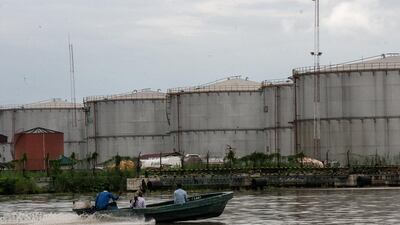Nigeria’s economic growth slowed for the second consecutive quarter as oil production fell.
Gross domestic product in Africa’s largest crude producer expanded 1.5 per cent in the three months through June from a year earlier, the National Bureau of Statistics in Abuja said in a report released on Twitter on Monday. That compares with 1.95 per cent in the first quarter.
Oil output fell to 1.84 million barrels per day in the period. That is the lowest since the first quarter of last year, when the Nigerian economy was contracting. While the fuel accounts for 9 per cent of GDP, crude is the West African nation’s biggest source of foreign income. Crop production grew at the slowest pace since 1987, statistician general Yemi Kale said on Twitter.
Nigeria’s economy is struggling to recover from its first contraction in a quarter-century in 2016, when the price and output of oil fell the most in decades. The International Monetary Fund forecast this year’s economic growth at 2.1 per cent from less than 1 per cent in 2017 as the crude sector improves and makes available more foreign currency needed for imports.
President Muhammadu Buhari in June signed a budget of 9.1 trillion naira (Dh91.81 billion) for this year, the nation’s biggest yet, and increased investment in roads, rail, ports and power to boost the economy. To further spur growth, the central bank last week pledged to invest in corporate bonds aimed at financing projects in agriculture and manufacturing.
Increased spending and the central bank’s move to lend cheaper money to large companies should support stronger growth in the second half of the year, said Feyisike Ilemore, an analyst at Arm Research.
The central bank has kept its key rate at a record high of 14 per cent for more than two years to fight inflation that at 11.1 per cent in July remains above target. Policymakers may increase rates given price risks from spending ahead of general elections planned for February, according to Deputy Governor Joseph Nnanna.
“Given the slowdown in agriculture and the spending boost expected, they are probably still quite concerned about inflation in the second half” of the year, said Michael Famoroti, an economist at Vetiva Capital Management.
The economic news came as Oando is looking to boost crude output from next year as the Nigerian producer breaks the back of a $2.5bn debt burden built up through the 2014 acquisition of oil and gas assets from US giant ConocoPhillips.
The borrowings will be almost 90 per cent lower by the third quarter of next year and the company is now preparing for its next stage of development, chief executive Wale Tinubu said at Oando’s Lagos headquarters. “We have purchased enough reserves and our job should really be to exploit those reserves,” he said.
_______________
Read more:
Nigeria's state oil company still can't make money
Oil-rich Nigeria turns its attention to renewables
_______________
Oando focused on repaying the debt after the ConocoPhillips deal to cushion the impact of the financing costs, but that came at the expense of growth, according to the CEO. The company, listed in Johannesburg and Lagos, is now able to increase its number of rigs and reopen oilfields, he said, taking advantage of a recovery in the oil price.
Oando has more than 450 million barrels of reserves following the ConocoPhillips acquisition and has interests in 14 oil exploration licences in Africa’s biggest crude producer. Its Oando Energy Resources unit aims to grow production organically to 75,000 barrels per day by 2023 from 40,000 barrels, while also seeking “acquisition opportunities”, which could help it exceed that goal, Mr Tinubu said.
Besides repaying debt, the company sold parts of the business to focus on more profitable areas, he said. Disposals include a stake in a gas distribution and power unit to Helios for $115.8 million in 2016, while Oando gave up its majority stake in a service station and fuel storage and supply business.
Oando remains committed to its oil trading operation, Mr Tinubu said. “We are focused on developing that side of our business, which is really to export Nigerian crude and bring in products wholesale.”
He also commented on a Nigerian government cap on petrol prices at below-market costs that has caused many private retailers to stop imports. That has left the state-owned Nigerian National Petroleum to handle supply and effectively subsidise fuel for Nigerians.
“It’s not popular to increase petrol prices,” the CEO said. “The reason we don’t have a country that is exporting petroleum products is because of subsidies. Our refineries were never repaired because they never had enough cash flow to fix them. That’s because they were always selling product at a discount.”
Nigeria restricts pump prices to 145 naira per litre. That makes the Opec member one of the 10 cheapest places in the world to buy petrol, according to GlobalPetrolPrices.com.
Mr Tinubu and his deputy at Oando were last month dealt a court defeat as firms they own or part-own were ordered to pay $680m in a dispute over corporate shareholdings. The CEO declined to comment as the case is ongoing.

